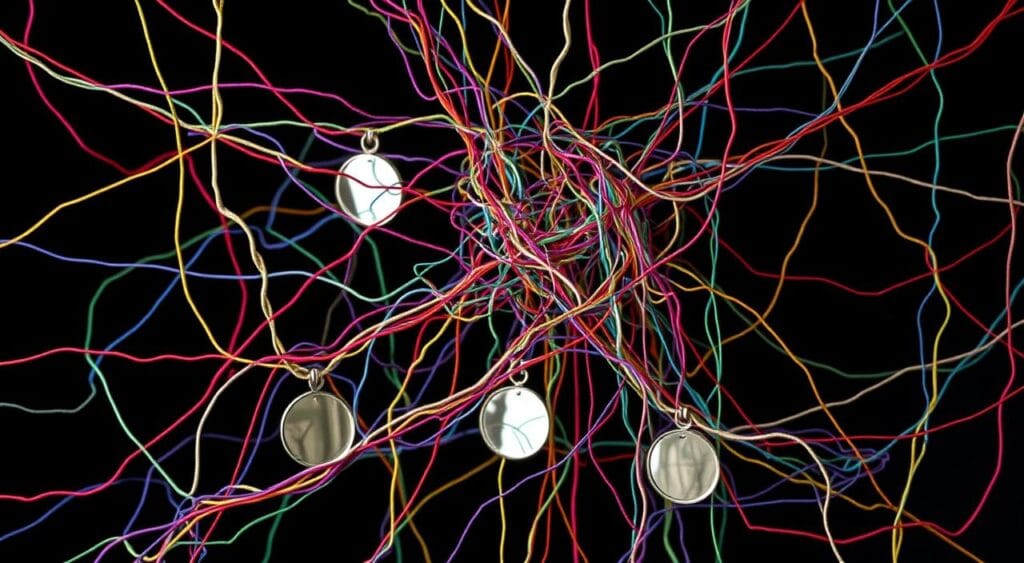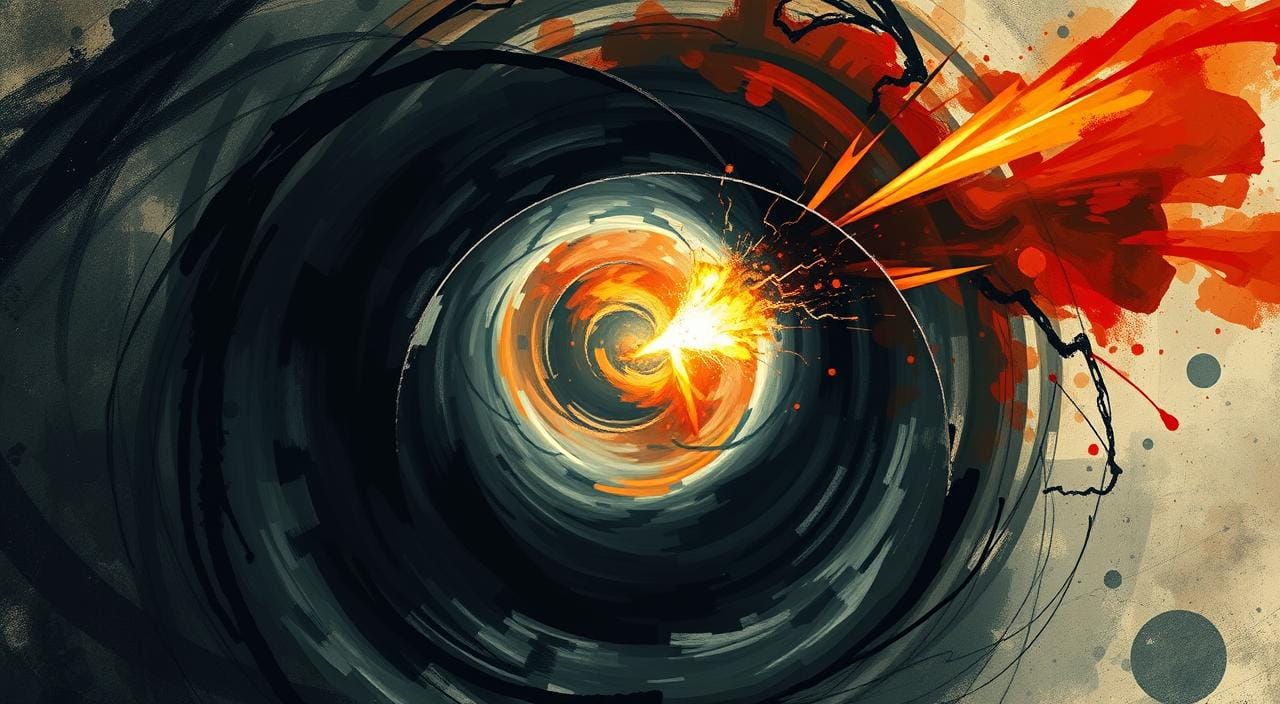Ever found yourself stuck on a narcissistic ex, even after it’s over? You’re not alone. Many people struggle to shake off the grip of a narcissist, even after they’ve cut ties. But why does it feel so hard to move on? What makes a narcissistic relationship so hard to let go of? Discover the deep reasons behind your obsession with your narcissistic ex. So, learn why you keep thinking about your narcissistic ex?
Key Takeaways
- Narcissists often pretend to be friends with ex-partners to control them1
- Narcissists don’t care about others’ feelings and might enjoy their pain1
- Their tactics of trauma bonding and love bombing can make you feel addicted1
- Understanding the loneliness and crisis after a narcissistic relationship is crucial for healing1
- Building your self-worth is key to resist going back to a toxic ex2
Understanding the Profound Loneliness of Narcissistic Abuse
Narcissistic relationships can make people feel very isolated and alone. Those who have been abused by narcissists often feel empty and lost after the relationship ends3. The initial phase of love bombing, where the narcissist showers them with love, can deeply affect a person’s life in a short time3.
This intense connection is later replaced by manipulation. The victim longs for the positive attention they once received3.
The Unique Emptiness After a Narcissistic Relationship
Ending a relationship with a narcissist can make you feel incredibly lonely and worthless3. Healing from narcissistic abuse is hard and painful. The negative experiences often become more prominent over time3.
Many people find themselves constantly thinking about their narcissistic ex. They struggle to move on, even when the relationship was unhealthy3.
Facing the Existential Void and Panic
The emptiness and isolation after a narcissistic relationship can lead to an existential crisis. Victims may find it hard to reconnect with their true self. They have internalized the narcissist’s distorted view of them4.
This can cause panic and despair. They feel lost and disoriented without the narcissist’s influence4.
To overcome the abuse and find oneself, it’s important to acknowledge the negative experiences. Focusing on self-reclamation is key3. By embracing loneliness, individuals can start healing. They can become joyful, confident, and whole again4.
The Trauma Bond and Love Bombing Tactics
Narcissists are experts at manipulation, creating a strong emotional trap called trauma bonding5. They shower their victims with love and attention to make them feel special5. This is followed by a cycle of idealization and devaluation, making it hard for the victim to leave.
The Idealization and Devaluation Cycle
Narcissists create jealousy and love triangles to lower their victim’s self-esteem5. This cycle of ups and downs makes the victim feel off-balance and unsure of their worth6. The trauma bond makes the victim think the abuser is unique, even though they use the same tricks on others5.
Intermittent Reinforcement and the Chemical Addiction
The narcissist’s unpredictable behavior can lead to addiction in the victim7. This addiction is fueled by fear and instability, making it hard to break free7. The victim may still feel a strong bond to the narcissist even after the relationship ends5.
| Trauma Bonding Stages | Description |
|---|---|
| Love Bombing | The narcissist showers the victim with excessive attention, affection, and praise to rapidly create a deep emotional connection. |
| Trust and Dependency | The victim becomes emotionally and psychologically dependent on the narcissist, believing they are the only one who can meet their needs. |
| Shift to Criticism and Devaluation | The narcissist begins to criticize, devalue, and manipulate the victim, leaving them feeling worthless and questioning their self-worth. |
| Manipulation and Gaslighting | The narcissist uses tactics like gaslighting to make the victim doubt their own reality and perception of the relationship. |
| Resignation & Giving Up | The victim may feel hopeless and resigned to the abusive dynamic, believing they have no choice but to remain in the relationship. |
| Loss of Sense of Self | Over time, the victim may lose their sense of identity and individuality, becoming entirely dependent on the narcissist’s approval and validation. |
| Emotional Addiction | The victim can develop a deep emotional and psychological addiction to the narcissist, making it extremely difficult to break free from the trauma bond. |

Understanding trauma bonding and narcissistic tactics is key to escaping abusive relationships. By subscribing to our newsletter, you get expert advice, tips, and support to help you heal and find yourself again567.
8 Reasons You Keep Thinking About Your Narcissistic Ex
Getting over a relationship with a narcissist is tough. Many can’t stop thinking about their ex, even after it’s over. This is called rumination. It’s a result of the trauma and codependency from narcissistic abuse. Knowing why helps us heal and move on from our ex.
- The Lingering Trauma: Emotional abuse and manipulation leave deep scars. They cause ongoing pain and a need for closure8.
- The False Sense of Intimacy: Narcissists use love bombing to create a fake emotional bond. It’s hard to let go of this feeling, even after it’s over.
- The Idealized Image: Narcissists show a perfect, grandiose image. It’s hard to see the truth behind their abusive actions.
- The Intermittent Reinforcement: The mix of idealization, devaluation, and occasional affection creates a strong trauma bond. It makes it hard to break free.
Knowing why we ruminate is the first step to healing. It helps us take back our lives from the narcissist. Understanding the emotional and psychological impact is key to freedom and self-empowerment.

“The trauma of a narcissistic relationship can leave us feeling lost, confused, and desperately longing for the person who once made us feel special, even if they ultimately betrayed us.”
The Unique Emptiness After a Narcissistic Relationship
Ending a narcissistic relationship leaves a deep sense of existential loneliness and emptiness. This is because the narcissist creates a false sense of closeness, then takes it away. This leaves the victim feeling alone and doubting their worth8. This emptiness makes us want to reconnect, even though the relationship was bad89.
Healing the Existential Loneliness
Ending a narcissistic relationship can leave us feeling lost and alone. But, we can find our way back by practicing mindfulness and forgiving ourselves. These steps help us find our true self and purpose again10.
Breathing Through the Pain
Mindful breathing can be a lifeline when we feel lost. It helps us calm down by focusing on our breath. Slow, deep breaths can soothe our minds and bodies, making room for healing10.
Self-Forgiveness and Acceptance
Forgiving ourselves is key to moving past narcissistic abuse. We must understand that what happened wasn’t our fault. We deserve love and kindness, even when others try to control us10. Self-compassion helps us let go of guilt and shame, leading to healing and growth.

To heal from a narcissistic relationship, we need self-care, mindfulness, and self-forgiveness. These practices help us find our true purpose and move forward with strength and confidence10.
Resisting the Urge to Seek Closure
After a relationship with a narcissist, the urge to seek closure is strong. Yet, we must fight this urge. Narcissists can’t give real closure, and chasing it can lead to more harm and a longer healing time.
Narcissists lack empathy and remorse, making true closure impossible. Narcissistic relationships often end in a discard phase, where the narcissist moves on without caring. They might lie and blame their partner for the breakup to keep their ego intact11.
Seeking closure from a narcissist can hurt you emotionally and mentally. The aftermath of being discarded can cause anxiety, depression, and health issues11. They might even try to take your assets or fight for custody.
Instead, focus on healing and accepting yourself. Set goals, take action, and use breath work to help in the healing process. By focusing on your growth and care, you can escape the cycle of narcissistic abuse and start anew.

“The greatest act of self-love is to let go of the need for closure from a narcissist. It’s the hardest, but most necessary, step toward healing.”
Breaking the Cycle of Narcissistic Abuse
Getting out of narcissistic abuse can seem like a never-ending fight. But, it’s possible to break free and start healing. The first step is to see through the narcissist’s tricks12.
Narcissists use love bombing, idealization, devaluation, and hoovering to keep their victims trapped13. The devaluation phase, filled with harsh criticism, is especially hard. The cycle can keep repeating, with different lengths13.
Recognizing the Narcissist’s Manipulation Tactics
12 Narcissists make it hard to leave by creating a chemical addiction. They think their victims still love them, even when they say they’re done12. They see any contact as a sign of forgiveness for their abuse12.
12 Covert narcissists might start soft to see if you’re still interested12. They’ll do anything to keep control, even ruining new relationships or plans12. Their main goal is to keep power over their exes, even after it’s over12.
14 Knowing the patterns of narcissistic abuse is key to breaking free. With awareness and a strong will to heal, you can overcome and take back your life14.
Rebuilding Your Life Without the Narcissist
Starting over after a narcissistic relationship can seem tough, but it’s key to moving forward15. It’s about recognizing the emotional damage and the hard work of leaving the narcissist’s grip16. By taking care of yourself, trying new things, and being around supportive people, you can find your way again.
Reclaiming your identity is a big part of this journey. The narcissist might have made you doubt yourself, leaving you feeling lost. Finding activities that make you happy can help you find your passions and values again15. This journey of self-discovery is crucial for healing and finding who you are, free from the narcissist’s influence.
- Explore new hobbies and interests that ignite your curiosity and creativity.
- Reconnect with friends and family who can provide emotional support and validation.
- Seek out opportunities for personal growth, such as educational courses or workshops.
- Practice self-care rituals that nourish your body, mind, and spirit.
Be gentle with yourself as you move forward16. Healing from a narcissistic relationship takes time, patience, and kindness towards yourself. By focusing on your well-being and personal growth, you can leave the narcissist’s control behind and start anew.
| Rebuilding After Narcissistic Abuse | Key Strategies |
|---|---|
| Reclaiming Identity | Explore new hobbies, reconnect with supportive loved ones, seek personal growth opportunities |
| Practicing Self-Care | Engage in nourishing rituals, prioritize mental and physical wellbeing, be patient and compassionate with yourself |
| Focusing on Personal Growth | Embrace the unknown, seek professional support if needed, and commit to your own healing and empowerment |
The path to healing after narcissistic abuse is challenging, but it’s a vital step towards a better future1516. By focusing on self-care, personal growth, and finding your true self, you can break free from abuse and build a life filled with happiness and freedom.
“The journey of a thousand miles begins with a single step.” – Lao Tzu
The Importance of No Contact
Keeping a strict no contact rule is key when getting over narcissistic abuse. It’s important to not give in to the narcissist’s efforts to stay in touch17.
Narcissists want to keep their victims close to feed their need for validation and control17. Breaking the no contact rule can make you feel exposed and lead to physical and emotional problems18.
Reasons Narcissists Want to Maintain Contact
- Preserve their image and sense of control
- Obtain narcissistic supply from you, their former source
- Sabotage your healing process and maintain power over you
- Resolve perceived issues or unfinished business
To really escape the narcissist’s grip, maintaining boundaries and cutting off all contact is crucial17. The first few months without them are tough, but with time and care for yourself, the urge to reconnect will fade18.
“To get a narcissist to discard you forever, cutting off all contact and setting firm boundaries is essential to remove oneself from the narcissist’s Rolodex of supply sources.”17
Start your healing journey and take back your power by fighting off the narcissist’s manipulation tactics. With patience and kindness to yourself, you can overcome narcissistic abuse and start anew1718.
Embracing Your Worth Beyond the Narcissist
After a narcissistic relationship, remember your self-worth goes beyond what the narcissist saw. Reclaiming your power and self-love is key to healing. It’s time to find your true identity and purpose, free from the narcissist’s toxic grip.
Embracing your worth means facing the false beliefs the narcissist instilled. Narcissistic abuse makes people feel worthless and19 inadequate. But these feelings don’t show who you really are. They’re just a twisted view created by the narcissist20.
- Acknowledge and challenge the critical voices in your head that undermine your self-esteem.
- Engage in self-care practices that nurture your body, mind, and spirit.
- Surround yourself with supportive individuals who celebrate your unique strengths and talents.
- Explore activities and hobbies that bring you joy and a sense of purpose.
By embracing your worth, you’ll regain your power and live a life that truly reflects your desires20. Your value isn’t based on the narcissist’s opinion. It’s based on who you are and the amazing potential you have.
“You are not broken. You are a survivor, and your strength is greater than you know.”
Keep moving forward in your healing journey. Trust in your resilience and the power of your self-worth20. With each step, you’ll grow into the person you were meant to be, free from the narcissist’s hold.
Embrace your worth, take back your story, and let your light shine. You are worthy, resilient, and the creator of your own amazing future20.
Seeking Professional Support for Healing
Healing from a narcissistic relationship is tough, but getting help can change everything. A good therapist can offer insights, coping strategies, and help us find our lost self. Studies show that 45% of those with low self-esteem from a narcissistic ex go to counseling21. This shows how crucial professional help is in dealing with narcissistic abuse.
Therapy offers a safe place to deal with tough emotions. People who’ve been with a narcissistic spouse often face trauma and PTSD21. A therapist can help us find ways to deal with loneliness and identity loss from abuse.
Also, getting help can help us stop the cycle of abuse. Many people healing from narcissistic abuse want to regain confidence and power21. A therapist can teach us how to spot and resist narcissistic manipulation. By focusing on our healing, we can break free from toxic patterns and start anew.
FAQ
Why do I keep thinking about my narcissistic ex even after the relationship has ended?
What is the profound loneliness that can arise after a narcissistic relationship?
How do narcissists use manipulation tactics like love bombing to create a trauma bond?
What are the 8 key reasons I keep thinking about my narcissistic ex?
How can I heal the existential loneliness after a narcissistic relationship?
Why is it important to avoid seeking closure from a narcissist?
How can I break free from the cycle of narcissistic abuse?
What steps can I take to rebuild my life after a narcissistic relationship?
Why is the no-contact rule so important when dealing with a narcissist?
How can I embrace my inherent worth and value beyond the narcissist’s influence?
Why is seeking professional support important for healing from a narcissistic relationship?
Source Links
- 8 Disturbing Reasons Narcissists Stay Friends with Their Exes – https://kimsaeed.com/2022/11/01/8-disturbing-reasons-narcissists-stay-friends-with-their-exes/
- The 5 Situations When A Narcissist Ex Will Think About You – https://www.exboyfriendrecovery.com/does-my-narcissistic-ex-think-about-me-2/
- If You’re Still Missing Your Narcissistic Ex After They’re Gone, Read This – https://www.yourtango.com/2019328998/recovering-narcissistic-abuse-and-why-you-still-miss-your-narcissist-ex
- Healing Isolation, Fear and Loneliness After Narcissistic Abuse – https://blog.melanietoniaevans.com/healing-isolation-fear-and-loneliness-after-narcissistic-abuse/
- 10 Shocking Ways To Break A Trauma Bond With A Narcissist – https://thoughtcatalog.com/shahida-arabi/2023/01/10-shocking-ways-to-break-a-trauma-bond-with-a-narcissist/
- 7 Stages of Trauma Bonding – Crossroads Antigua – https://crossroadsantigua.org/7-stages-of-trauma-bonding/
- Trauma Bonding – Is It Love Or Something Else? – https://blog.melanietoniaevans.com/trauma-bonding-is-it-love-or-something-else/
- ‘I’m a Narcissist, Here’s What Everyone Gets Wrong’ – https://www.newsweek.com/i-am-narcissist-heres-what-everyone-gets-wrong-1736417
- How To Get Over A Narcissist: 11 Essential Steps – https://www.mindbodygreen.com/articles/how-to-get-through-a-breakup-with-a-narcissist
- How to stop handing over narcissistic supply – https://terezashealthblog.wordpress.com/2017/09/27/how-to-stop-handing-over-narcissistic-supply/
- Breaking Up and the Discard: How a Narcissist Acts at the End of a Relationship – https://beentheregotout.com/breaking-up-and-the-discard-how-a-narcissist-acts-at-the-end-of-a-relationship/
- What narcissists are thinking when you stay in contact after the discard – https://sylvialongmire.medium.com/what-narcissists-are-thinking-when-you-stay-in-contact-after-the-discard-4fda3b6666fb
- Narcissistic Abuse Cycle – My Hidden Scars – https://myhiddenscars.com/narcissistic-abuse-cycle/
- Why the Narcissistic Abuse Cycle Feels like CPTSD Comfort. – https://cptsdfoundation.org/2020/11/20/why-the-narcissistic-abuse-cycle-feels-like-cptsd-comfort/
- Why Recovering From the Narcissist in Your Life Is So Hard – https://www.psychologytoday.com/us/blog/tech-support/201606/why-recovering-the-narcissist-in-your-life-is-so-hard
- Getting Over Your Narcissistic Ex | Flourishing Hope Blog – https://www.flourishinghope.com/getting-over-your-narcissistic-ex/
- Do Narcissists Contact Their Exes – Yes, Here’s Exactly Why – https://www.exboyfriendrecovery.com/do-narcissists-contact-their-exes/
- Is It Ever Okay To Break No Contact with A Narcissist? – https://medium.com/@katiabeeden/is-it-ever-okay-to-break-no-contact-with-a-narcissist-30fbf3f459ef
- Ask HN: How did you fix your narcissism? – https://news.ycombinator.com/item?id=22255268
- When the Narcissist Reaches Out — Yay With Me – http://www.yaywithme.com/blog/when-the-narcissist-reaches-out
- Narcissistic abuse therapy – Heal after having a narcissistic spouse | Wisdom Within Counseling and Coaching – https://wisdomwithinct.com/narcissistic-abuse-therapy/







